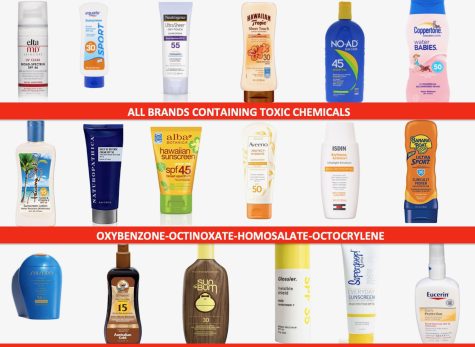When Greenwashing gets the best of us

A few years ago, I went on vacation to Key West with a group of friends. In a vain attempt to offset the sluggishness brought on by travel, we made plans to go snorkeling the next day. Determined to set a an environmentally friendly example, I took charge and booked our excursion with an eco-friendly snorkeling company. Their website advertised that the company both respected wildlife and worked to protect Florida’s coral reefs from the harmful effects of tourism.
They also had some general rules listed online – but one stood out above all else: you MUST wear only reef-friendly sunscreen. No other sunscreen was allowed anywhere near the boat, or else. As a very pale, lifelong rule-follower who cares deeply about the environment, I walked swiftly to the nearest convenience store and bought an overpriced bottle of Neutrogena boldly labeled “reef safe.”
When we arrived at the dock the next day, the boat captain made her rounds to assess everyone’s sunscreen before we were allowed to embark. After glancing at mine for 0.002 seconds, I heard the dreaded words:

“Nope, that’s not going to cut it.”
“But it says it’s reef-safe!” I whined, annoyed that I paid $15.95 for useless sunscreen.
“That literally means nothing,” she said. And then she pointed out all harmful chemicals listed under “ingredients” that could damage coral reefs.
That’s the day I learned what greenwashing is. Despite my best efforts to buy an eco-friendly sunscreen, I had had fallen victim to a common marketing tactic that is designed to make products seem more sustainable than they are. It was a hard lesson learned, and my reward was a gnarly sunburn at the end of the day.
Greenwashing is all about perception. Companies who practice greenwashing spend money on marketing a product that claims to be environmentally conscious, rather than actually implementing business practices that support the environment.
The same thing happens within Fairtrade: Fairwashing is similar tactic where companies misrepresent how equitable they are in terms of labor practices, wages, and equality for workers. Just because something is printed on a label, doesn’t mean it’s true!
It’s despicable that companies are taking advantage of the momentum surrounding important issues like the climate crisis and fair trade for their own financial gain. But, it’s important to remember that not all hope is lost. Public knowledge about greenwashing and fairwashing has increased significantly over the past several years. To combat greenwashing and fairwashing, the best thing you can do as an individual is to educate yourself on how to spot it happening, and to call it out wherever you see it.
Here are some ways to spot and call-out greenwashing and fairwashing:
-
 1
1Beware: vague buzzwords
You’ve seen packaging at the store labeled “all-natural” or “eco-friendly” (or in my case, “reef safe.”) As I learned the hard way, these phrases are usually meaningless. Fairwashing usually will include phrases like “fairly made,” and “thoughtfully crafted. There are no actual regulations for what makes something “eco-friendly” or “thoughtfully crafted” – it’s just a marketing ploy.
-
 2
2Instead: look for certifications
Unlike vague buzzwords, certifications on product packaging (like our Fairtrade label) do have standards and regulations. These labels offer real protection to the environment and to workers. You should be able to research the labels and see clearly defined standards and regulations listed transparently online. Other great labels to look out for: Non-GMO Project, USDA organic, Certified B-Corp, EWG Verified and Marine Stewardship Council.
-
 3
3Beware: green packaging and labeling
Sometimes brands use the color green or nature scenery on their packaging to imply sustainability. Of course, not all brands that use the color green are greenwashing – but it is still important to do research and think before you buy.
-
 4
4Instead: look for simple packaging
Oftentimes, companies using greenwashing will have their products in an unnecessary and unsustainable amount of packaging. Instead, look for packaging that is minimal and recyclable (or even compostable).
Call out Greenwashing when you see it:
Utilize social media to let companies know that you want a change. By engaging and getting involved on social media, you can ask questions and hold companies accountable. You can also contact your local, state and federal elected leaders and weigh in on timely issues and policy changes – let politicians know that addressing greenwashing is an important part of a greater climate policy.
We’re in this together
Fairtrade America partners with brands on the journey to certification and beyond. We can help with everything from finding a certified supply chain to marketing your newly certified product.
Get in Touch





